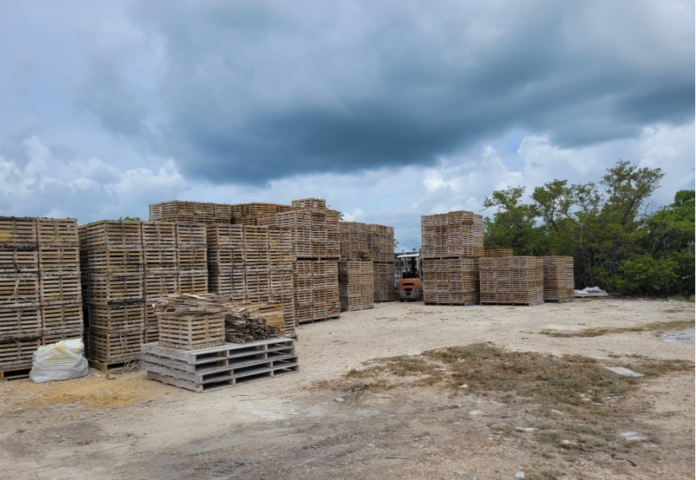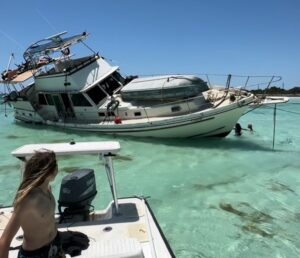
Despite decades of commercial fishing activities on property situated across from Sea Oats Beach on Lower Matecumbe Key, the Sojourn property has held a conservation zoning designation. Land owners are now seeking village council approval to revert zoning on the property back to commercial fishing, which the parcel had before the village’s incorporation.
A zoning change request for the Sojourn property came before the seven-person Local Planning Agency on May 13. The LPA is tasked with hearing, reviewing and recommending to the council proposed amendments to the village’s land development regulations, comprehensive plan and zoning map.
Specifically, Sojourn South LLC submitted applications to the village requesting a future land use map (FLUM) amendment from conservation to mixed-use and a zoning change from conservation to commercial fishing for the vacant site. Historically, lobster storage and docking for commercial fishing vessels has been the main use for the property, located next to a commercial fishing property in Lobster Walk.
A majority of the Sojourn property is under water, with a thin slice used for fish trap storage. The property is devoid of vegetation and isn’t located within the state conservation recreation lands’ boundary or critical habitat area.
Ty Harris, attorney representing Sojourn South, told LPA members his applicant wants the property’s zoning to return to commercial fishing, which it had before the village’s incorporation in 1997. Twenty years ago, the property was zoned commercial fishing by Monroe County.
Harris said discussions between the owner and the village in the 2000s over a possible purchase for less than $1 million fell through. The village proceeded to rezone the property to conservation.
Harris noted some properties rezoned not long after Islamorada’s incorporation are starting to seek a change to their original zoning. It’s due to the state Legislature mandating Florida municipalities add language to their comprehensive plans regarding the protection of private property rights. He also alluded to the Shands v. City of Marathon court case last summer, which brought the idea that even if the zoning of a property changed years ago, property owners would have the ability to get relief through the courts.
Harris said the applicant intends to construct a dock while preserving nearby mangroves. A rezoning approval is needed, however, to construct the dock.
“I can put up a cell tower, but I can’t put up a dock,” Harris said in relation to the allowable uses under a conservation zoning designation.
Tony Hammon, LPA member, said lobster men and traps were a part of the Islamorada’s Lower Matecumbe community long before development of houses and condominiums now seen in the area. Hammon supported a recommendation to the council to proceed with the FLUM and zoning change.
“As a kid, I remember seeing those traps there,” Hammon said.
A petition containing signatures from neighbors, residents and owners of properties near the Sojourn property and sent to the village requested denial of any zoning change. In the letter, the group noted a commercial fishing zone opened the possibilities for other structures on the property.
“Trap storage is one thing, but once the land itself is modified, the conservation aspect that we want to see maintained will be forever marginalized,” the petition read.
Deb Gillis, LPA chairwoman, proposed the LPA recommend the council approve the FLUM from conservation to mixed-use, but limit the permitted activities to commercial fishing. Those uses include docking, loading and unloading of commercial fishing vessels; maintenance and storage of commercial fishing traps; and uses and structures accessory to commercial fishing. LPA members also agreed on recommendations to add docking facilities as an allowable use on the property and emphasize protections to nearby mangroves.
“No, you can’t build a house. No, you can’t build a restaurant and the other things listed in commercial fishing,” Gillis said. “There’s not enough ground on that lot to build a house and make your setback and all the things you need to do to build a house.
Changes recommended by the LPA to the village council, which only allow commercial fishing activities and docking on the Sojourn property, addressed the Bay Harbour Condominium group’s concerns, president Kevin O’Neill said. The LPA will also recommend the council approve the property’s rezoning from conservation to commercial fishing.
“We are particularly happy that the property will not evolve into something completely different from what we see today. In particular, the fact that you are including language that continues to protect the mangroves is heartwarming,” O’Neill wrote to village officials.
Sojourn’s application and the LPA’s recommendation are expected to be heard by the village council in June.
























